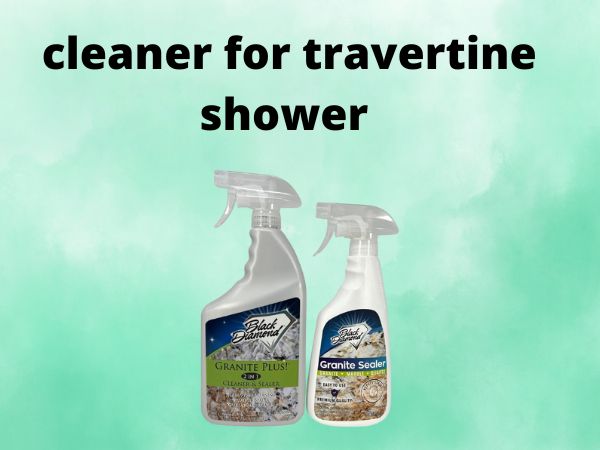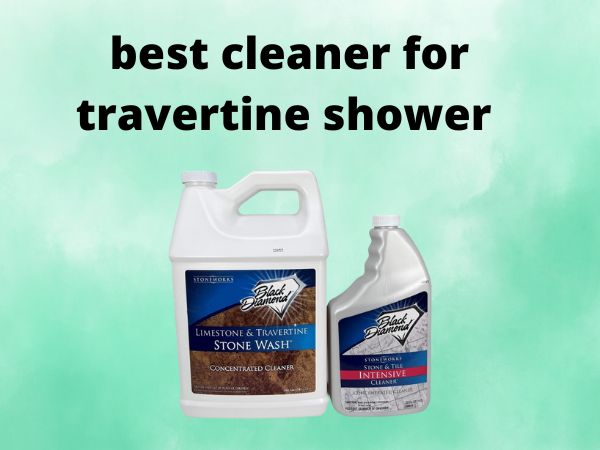What Is The Best Cleaner for Travertine Shower [In 2024]
Travertine tile is a popular choice for showers and other wet areas due to its natural beauty and texture. However, as a porous and delicate natural stone, it requires special care and cleaning methods to maintain its appearance and prevent damage. Using the wrong cleaner can etch or erode the surface over time.
Table of Contents
Our Top 4 Picks
| Cleaner | Type | Rating | Pros | Cons |
| Miracle Sealants 511 Porous Plus | Impregnating Sealer | ⭐⭐⭐⭐ | – Deeply seals porous stone – Oil & water repellent barrier – Stain, mold, mildew resistance | – Needs scrubbing to penetrate – Can leave residue film |
| Aqua Mix Travertine Cleaner | Daily Spray Cleaner | ⭐⭐⭐⭐⭐ | – Specially formulated – Removes soap scum & hard water buildup – Fresh lemon scent | – More expensive than basic cleaners – Requires continued regular use |
| Granite Gold Daily Cleaner | Daily Spray Cleaner | ⭐⭐⭐ | – Gentle pH neutral formula – Citrus scent – Safe for travertine | – Poor spray nozzle coverage – Tendency to run off vertical surfaces – Needs hand application |
| Cleanmax Travertine Brightener | Heavy Duty Acidic Cleaner | ⭐⭐ | – Made to brighten travertine – Just spray and rinse | – Leaves cloudy residue – Doesn’t fully remove buildup – Can set stains |
What is Travertine Tile?
Travertine is a form of limestone that is created by natural mineral springs. As hot, mineral-rich water flows through limestone, it leaves behind calcium deposits that build up over time to form travertine. These natural deposits give travertine a distinctive porous surface and earthy colors.
Travertine is quarried and then often cut into tiles or countertops. It is prized for its aesthetic appeal and provides a uniquely natural look in bathrooms, showers, and spas. The holes and pits in the surface fill up with grout or cement during installation. This helps protect the delicate stone while preserving its natural texture.
Pros and Cons of Travertine Tile
Pros:
- Natural, unique aesthetic
- Distinctive texture provides interest
- Matches a variety of design styles
- Stain resistant sealants available
- Durable if properly maintained
Cons:
- Porous and prone to etching/pitting
- Requires resealing every 1-2 years
- Bacteria and mold can collect in holes/pits
- Needs special cleaners to prevent damage
- More expensive than ceramic or porcelain tile
So while travertine adds undeniable natural beauty to a space, it also requires vigilant maintenance to retain its appearance and prevent permanent damage over time, especially in wet areas like showers. Using the proper cleaners is key.
Popular Uses of Travertine Tile
Travertine is commonly used for:
- Showers – Provides a luxurious natural stone look. Surface pits fill with grout or cement for smoother texture.
- Bathroom Walls – Warm, earthy aesthetic works well with other natural materials like wood or stone.
- Backsplashes – Neutral colors complement a variety of cabinetry and countertops.
- Patios – Holds up well to outdoor elements. Provides visual interest and texture.
- Pool Decks – Non-slip texture provides needed traction around swimming pools, hot tubs.
In bathrooms, travertine brings the look and feel of a spa oasis with the stone’s organic colors and patterns. But proper cleaning is essential, especially in wet areas like showers, to prevent permanent damage and discoloration. Harsh cleaners can ruin the stone’s appearance.
Finding the Right Cleaner
It’s important to select a cleaner specifically formulated for natural stone to care for travertine showers without causing harm:
Avoid Harsh Chemicals
Many common household cleaners like bleach, ammonia, vinegar, etc. are too acidic or abrasive for delicate travertine. They can erode the surface and create permanent etching or pits over time. Only use specialty stone cleaners.
pH Level is Important
Look for cleaners with a neutral pH between 7 and 8 to avoid stripping the travertine’s protective sealant or damaging the surface. Alkaline/basic cleaners above pH 8 are too harsh.
Match Porosity Level
Travertine is a highly porous natural stone, so the cleaner must be formulated specifically for porous stone to effectively clean inside pores without harm. Use “porous marble” cleaners.
The key is finding natural stone cleaners strong enough to properly clean travertine yet gentle enough not to cause damage even with frequent use. Some of the best options include:
Best Cleaners for Travertine Showers
When it comes to keeping travertine showers looking their best, using the right stone-safe cleaner makes all the difference. Here are some top options:
1. Miracle Sealants 511 Porous Plus Impregnator
I’ve used this porous plus impregnator on my travertine shower walls and it works great at resisting stains and water marks. It took a little elbow grease to really get it down into the pores of the stone, but it seemed to seal well. I haven’t noticed any new stains since application. My only complaint is that it left a bit of a residue film on the surface that required some rinsing to remove. Overall, a solid sealant for porous, delicate stone.
Pros:
- Excellent at sealing and protecting porous stone
- Resists stains, water marks, and dirt buildup
- Specialized impregnating formula for travertine
Cons:
- Can leave some residue on surface after application
- Requires a bit of scrubbing to fully penetrate travertine
2. Aqua Mix Travertine Cleaner Spray
This Aqua Mix spray cleaner for travertine is a lifesaver for maintaining my stone shower! I use it daily to wipe down walls, giving them a little shine. It’s really effective at dissolving soap scum and hard water buildup with minimal scrubbing. What I especially love though is the fresh lemon scent – it makes the shower smell clean without strong chemical fumes. This cleaner is well worth the price for keeping travertine looking like new!
Pros:
- Specially formulated for travertine showers
- Removes soap scum, hard water stains with ease
- Fresh lemon scent leaves shower smelling clean
- Daily use helps maintain stone appearance
Cons:
- More expensive than basic household cleaners
- Must continue to spray regularly to prevent buildup
3. Granite Gold Daily Cleaner
This daily granite & stone cleaner by Granite Gold works decent enough for my travertine…when I can get it evenly distributed. I find the spray nozzle doesn’t work well to get an even coat on vertical surfaces which is pretty essential for shower walls. It often just streams out in one spot no matter how much I try to adjust it. The formula itself though is gentle with a nice citrus scent. I just end up pouring some onto a sponge to work it around by hand. Overall, it gets the job done but the application could be improved.
Pros:
- Gentle daily formula won’t damage stone
- Pleasant natural citrus aroma
- Non-acidic cleaner safe for travertine
Cons:
- Poor sprayer performance on vertical surfaces
- Formula runs before fully covering stone
- Must apply by hand for even distribution
4. Cleanmax Travertine Brightener
I had high hopes for this travertine brightener given the before and after pictures on the bottle, but unfortunately it didn’t live up to expectations. While it helped get some soap scum off, there are still sticky residues left behind on my tile. It almost seems to set stains in more with its cloudy film rather than fully rinsing clean. Pretty disappointed it didn’t brighten up my shower walls like I envisioned. Maybe with some major scrubbing it would fare better, but for a spray & rinse formula I expected better results.
Pros:
- Made to brighten up travertine surfaces
- Just spray & rinse formula with no scrubbing
Cons:
- Leaves cloudy residue and film behind
- Does not fully remove built-up soap scum
- Can set stains deeper into stone pores
Tips for Cleaning Travertine Showers
Follow these top tips when using any travertine shower cleaner for best results:

Test on Small Area First
Before using a new cleaner on the entire surface, first test on an inconspicuous spot to check for any discoloration or damage to the stone.
Use a Soft Cloth or Sponge
Only use a soft, non-abrasive sponge or microfiber cloth when scrubbing to avoid scratching travertine’s delicate surface. Never use abrasive pads.
Rinse Thoroughly
Completely rinse all cleaner residue off travertine to prevent soapy buildup or film that can attract more dirt over time.
Dry Immediately After Cleaning
After deep cleaning or using bleach-based cleaner, immediately dry travertine with a clean towel. Allowing moisture to pool can encourage mold/mildew growth.
With the proper care, travertine showers maintain their naturally gorgeous look and unique texture for decades. Take special caution by selecting a specialized stone cleaner and following safe cleaning methods. Avoid household cleaners that can irreversibly damage delicate travertine tile over time. Implement a regular cleaning routine for lasting beauty.
FAQs
Can I use vinegar to clean my travertine shower?
Yes, diluted vinegar makes an effective regular cleaner for travertine showers. Mix equal parts vinegar and water and wipe down the stone. Rinse thoroughly after cleaning. Avoid using straight vinegar, which is too acidic for frequent travertine cleaning.
What is the best way to remove soap scum from travertine tile?
For soap scum removal from travertine, use a gentle cleaner formulated specifically for natural stone, such as Miracle Sealants 511 Porous Plus, Aqua Mix Concentrated Travertine Cleaner, or Granite Gold Daily Cleaner. Apply the product to travertine and allow it to penetrate for 5-10 minutes before scrubbing and rinsing away. These special cleaners dissolve soap scum without damaging delicate travertine.
Why does my travertine shower tile look dirty even after cleaning?
Dirty-looking travertine even after cleaning it likely means there is leftover cleaner residue or hard water buildup trapped in the tiny pores and holes of the stone’s surface. It’s critical to completely rinse off any cleaner with clean water after use. Then immediately dry the travertine with a soft towel to prevent mineral deposit residue from hard water evaporation. Thorough rinsing and drying minimizes dirty residue on porous travertine tile.
Should I reseal my travertine shower regularly?
Yes, it’s recommended to reapply a natural stone sealer to travertine tile about once a year to protect the delicate porous surface from stains and damage. Especially in showers, using a specialty travertine sealer regularly prevents water, oils and dirt from penetrating deep into the travertine and causing permanent discoloration or difficult stains over time.
What is the most common mistake people make when cleaning travertine showers?
The biggest mistake people make is using the wrong type of cleaner on their travertine tile showers. Harsh chemicals like bleach, ammonia, acidic cleaners, etc. will etch or erode the delicate surface of travertine over time with regular use. Always select a natural stone cleaner specifically formulated to be gentle enough for porous stones like travertine for cleaning showers without causing eventual damage.
Conclusion
Summary of Best Cleaners
For safely and effectively cleaning travertine tile showers without damage, the top options include:
- Vinegar and Water – Gentle daily cleaner
- Specialty Stone Soap – Non-acidic travertine cleaner
- Hydrogen Peroxide – Disinfecting brightener
- Commercial Stone Cleaners – Convenient travertine maintenance
Whichever product you choose, be sure to select one specifically formulated for porous natural stone like travertine. Read all label instructions carefully before use. Test in a small area first.
Key Tips to Remember
Follow these simple tips whenever cleaning travertine showers:
- Use only natural stone cleaners
- Wipe with soft, non-abrasive materials
- Completely rinse away cleaner residue
- Quickly dry travertine after cleaning
Taking proper care preserves the beauty and lifespan of gorgeous travertine tile in high-moisture shower installations for years of enjoyment.


![5 Best Cleaner for Hard Water Stains in Shower [In 2024]](https://bathroomexplorer.com/wp-content/uploads/2024/01/best-cleaner-for-hard-water-stains-in-shower.jpg)
![What Is The Best Cleaner for RV Shower [In 2024]](https://bathroomexplorer.com/wp-content/uploads/2024/01/best-cleaner-for-rv-shower.jpg)
![Best Toilet Seat Sanitizer Spray [Kills Germs & Bacteria]](https://bathroomexplorer.com/wp-content/uploads/2024/01/best-toilet-seat-sanitizer-spray.jpg)
![Best Automatic Toilet Bowl Cleaners [with Pros&Cons]](https://bathroomexplorer.com/wp-content/uploads/2023/12/best-automatic-toilet-bowl-cleaner.jpg)